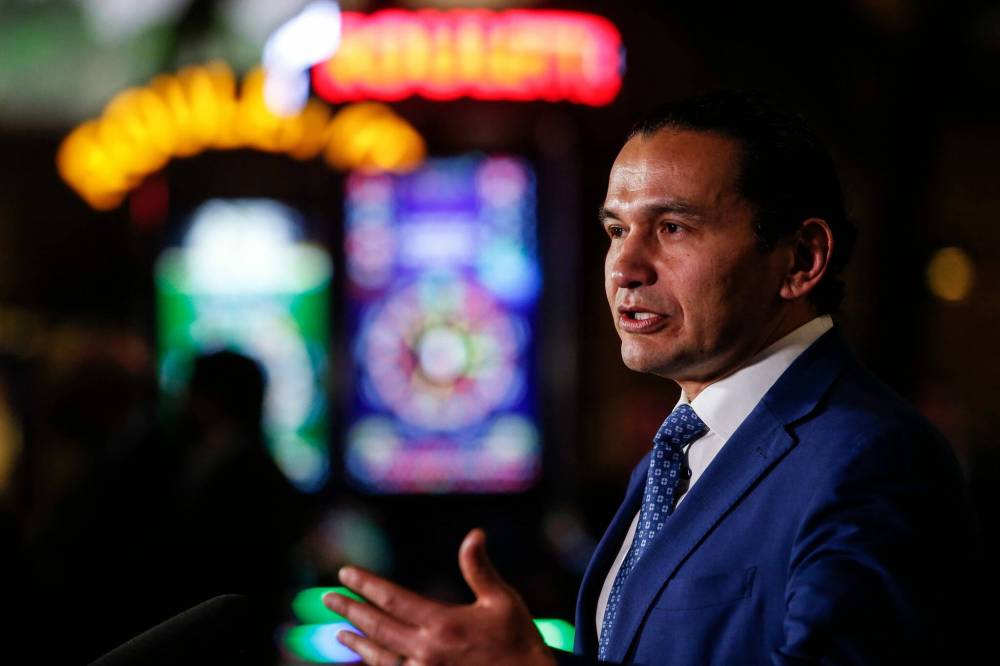The provincial government has ordered Manitoba Liquor & Lotteries officials to report suspicious transactions at its casinos to police in an effort to crack down on money laundering, which is often connected to the drug trade.
“(The directive) will help people build cases, that will help officers conduct investigations, and that will help hold people accountable who are responsible for the scourge of toxic drugs that we’re seeing, fentanyl and many other damaging drugs,” Premier Wab Kinew said at a news conference Monday at Club Regent Casino.
Until now, the Crown corporation reported dodgy activity to the Financial Transactions and Reports Analysis Centre of Canada, the federal financial intelligence unit and anti-money laundering supervisor. “Its mandate is to facilitate the detection, prevention and deterrence of money laundering and the financing of terrorist activities, while ensuring the protection of personal information under its control,” its website says.

JOHN WOODS / FREE PRESS
Manitoba premier Wab Kinew outlines the province’s latest response to money laundering at its casinos, Monday.
FINTRAC, as it’s known, is to investigate the activity and call in local police agencies.
Canadian casinos are required by law to report cash transactions that exceed $10,000 — by filing separate reports for payouts and buy-ins — to FINTRAC, as well as reports for any transaction they suspect could be related to money laundering or other illegal activity.
Following Monday’s directive, such transactions must be reported to both Manitoba police and FINTRAC, which is what’s done in Ontario and British Columbia, Manitoba officials said.
At the news conference, Kinew, flanked by MLL CEO Gerry Sul and RCMP and city police officials, touted the move as a tool for law enforcement to “bring the hammer down” on illicit drug traffickers by going after their money.
“People who bring toxic drugs into Manitoba towns, neighbourhoods, First Nations, need to be held accountable,” said Kinew.
Sul said money laundering puts the country’s financial systems at risk. Cash-rich casinos can be vulnerable to criminals trying to launder money, he said.
“At Manitoba Liquor and Lotteries, we take our job seriously and our duty to detect, deter and report suspicious activities in our casinos (seriously),” he said, adding he’s proud of the corporation’s anti-money laundering compliance system.
He said the directive would allow MLL to better share intelligence with local police agencies and “ultimately make our community safer.”
Winnipeg Police Service Supt. Cam Mackid said access to better intelligence will have a big effect.
“We would anticipate an exponential gain in the intelligence that we’re getting, that we can act on,” he told the Free Press on Monday, adding he expects city police to “absolutely” launch further money laundering investigations.
The corporation said it would beef up its anti-money laundering team by adding members and would spend $325,000 in new provincial money on new surveillance equipment.

MIKE DEAL / FREE PRESS FILES
Manitoba Liquor & Lotteries president and CEO, Gerry Sul, says the provincial government’s directive to report suspicious transactions at casinos to police will “ultimately make our community safer.”
Mackid said police had identified the need for more resources.
“Sometimes, the intel that comes from the casinos will be the impetus to start a larger investigation,” said Mackid. “That happens all the time, and hopefully, with this announcement, we’ll have more of those investigations coming from casino activity.”
The Crown corporation had reported alleged money laundering directly to law enforcement in the case of Mohammad Riyadul Hoque. The alleged drug trafficker is accused of laundering in excess of $10 million at Winnipeg casinos over three years before his arrest in September 2023. His case remains before the courts.
In an investigation, the Free Press found that Hoque was being watched by MLL investigators for years, having been the subject of internal incident reports since 2015. Liquor and Lotteries deemed him a “high-risk” patron early on and began flagging all of his transactions in city casinos to FINTRAC.
The Liquor and Lotteries anti-money laundering team took its concerns to Manitoba RCMP, which launched a lengthy probe in October 2022.
The Crown corporation files nearly 5,000 reports to FINTRAC annually, about 60 per cent of which are estimated to be required for above-the-board transactions exceeding $10,000. Of those 5,000 reports, about 400 are for suspicious transactions, and many of them may be related to the same individual, Sul said in October.
Justice Minister Matt Wiebe said Monday he would write a letter to federal ministers, including the public safety and finance ministers, to seek better information-sharing between FINTRAC and provincial law enforcement agencies.
“We have a pretty sophisticated provincial system of sharing amongst our law enforcement agencies that can be a part of the solution here, when it comes to sharing this financial information,” said Wiebe.
erik.pindera@freepress.mb.ca

Erik Pindera
Reporter
Erik Pindera is a reporter for the Free Press, mostly focusing on crime and justice. The born-and-bred Winnipegger attended Red River College Polytechnic, wrote for the community newspaper in Kenora, Ont. and reported on television and radio in Winnipeg before joining the Free Press in 2020. Read more about Erik.
Every piece of reporting Erik produces is reviewed by an editing team before it is posted online or published in print — part of the Free Press‘s tradition, since 1872, of producing reliable independent journalism. Read more about Free Press’s history and mandate, and learn how our newsroom operates.
Our newsroom depends on a growing audience of readers to power our journalism. If you are not a paid reader, please consider becoming a subscriber.
Our newsroom depends on its audience of readers to power our journalism. Thank you for your support.